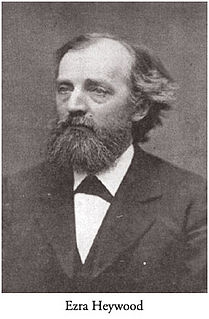A Quote by Ezra Heywood
Interest is theft, Rent Robbery, and Profit Only Another Name for Plunder.
Related Quotes
Legal plunder can be committed in an infinite number of ways; hence, there are an infinite number of plans for organizing it: tariffs, protection, bonuses, subsidies, incentives, the progressive income tax, free education, the right to employment, the right to profit, the right to wages, the right to relief, the right to the tools of production, interest free credit, etc., etc. And it the aggregate of all these plans, in respect to what they have in common, legal plunder, that goes under the name of socialism.
To take something from a person and keep it for oneself: that is robbery. To take something from one person and then turn it over to another in exchange for as much money as you can get: that is business. Robbery is so much more stupid, since it is satisfied with a single, frequently dangerous profit; whereas in business it can be doubled without danger.
Profit is vital to human well-being. Profit is the payment to entrepreneurs just as wages are payments to labor, interest to capital and rent to land. In order to earn profits in free markets, entrepreneurs must identify and satisfy human wants and do so in a way that economizes on society's scarce resources.
From the Anarchist standpoint, these artificial hindrances which are the cause of three main forms of usury-interest, profit, and rent, are, in the order of their importance, monopoly in the control of the circulating medium-money and credit, private property in land not based on occupancy and use, patent rights and copyrights, and tariffs.
We need to reverse three centuries of walling the for-profit and non-profit sectors off from one another. When you think for-profit and non-profit, you most often think of entities with either zero social return or zero return on capital and zero social return. Clearly, there's some opportunity in the spectrum between those extremes. What's missing is the for-profit finance industry coming in to that area. Look at the enormous diversity of the for-profit financial industry as opposed to monolithic nature of the non-profit world; it's quite astonishing.
Men naturally rebel against the injustice of which they are victims. Thus, when plunder is organized by law for the profit of those who make the law, all the plundered classes try somehow to enter, by peaceful or revolutionary means, into the making of laws. According to their degree of enlightenment, these plundered classes may propose one of two entirely different purposes when they attempt to attain political power: Either they may wish to stop lawful plunder, or they may wish to share in it.






























